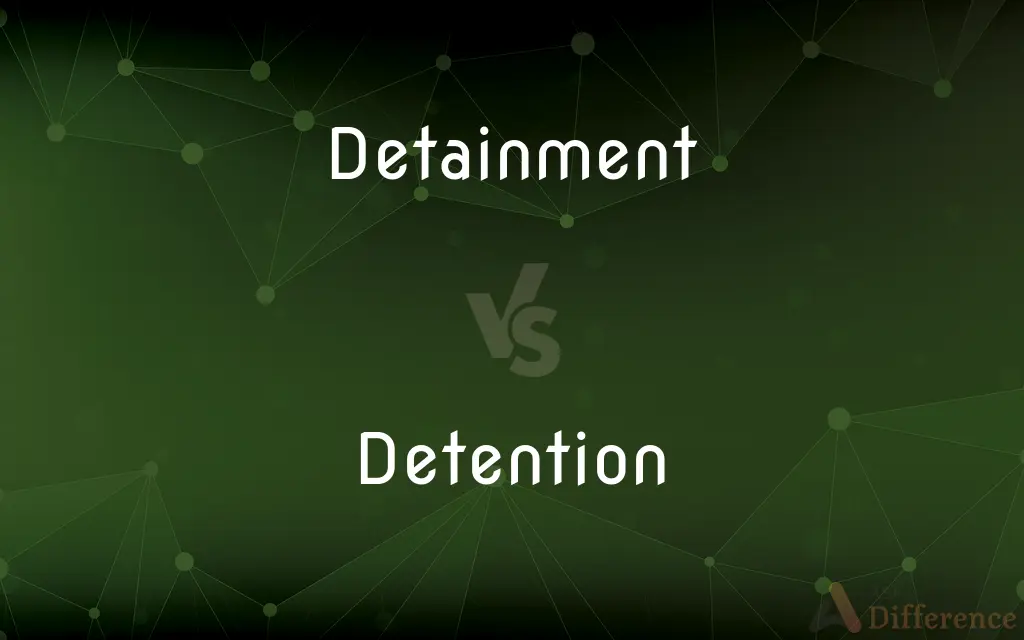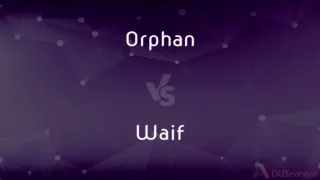Detainment vs. Detention — What's the Difference?
By Tayyaba Rehman & Urooj Arif — Updated on May 3, 2024
Detainment is the act of being legally held by authorities for questioning, typically brief, while detention is a broader term for confinement, often in educational or correctional contexts.

Difference Between Detainment and Detention
Table of Contents
ADVERTISEMENT
Key Differences
Detainment specifically refers to the process where authorities, such as police, hold someone temporarily for investigative purposes, typically without formal charges. Whereas, detention can refer to any form of confinement or restriction of freedom, often used in contexts like schools (punishing students) or prisons.
In legal contexts, detainment is used when someone is held to determine their involvement in a crime or for security checks. On the other hand, detention in a legal sense can be a longer-term holding pending trial or as part of serving a sentence.
Detainment is usually short-term and focuses on the necessity of immediate investigation. However, detention might not necessarily relate to criminal investigations and can be used for disciplinary reasons in schools or for immigration-related confinement.
While detainment is a temporary measure taken by authorities to ascertain details or prevent further issues, detention can be part of a strategic, longer-term approach in policy or educational discipline. Detainment often lacks the formal structure of detention, which can be legally defined and may have set durations and conditions.
Comparison Chart
Definition
Temporary custody by authorities for questioning.
Confinement or restriction in various contexts.
ADVERTISEMENT
Duration
Typically brief, usually hours or days.
Can be short-term or long-term.
Context
Mainly legal and police-related.
Educational, legal, and immigration.
Purpose
To investigate or prevent further issues.
Can be punitive, preventive, or protective.
Legal Implications
Generally without charge; preventive.
May involve charges or disciplinary action.
Compare with Definitions
Detainment
Short-term restriction of liberty for security reasons.
Airport security placed him in detainment due to suspicious behavior.
Detention
Confinement within an institution like a school or prison.
He served detention after school for breaking the rules.
Detainment
A precautionary hold by police.
Detainment was necessary until the threat level was assessed.
Detention
Holding of individuals by immigration authorities.
The airport detention of travelers raised concerns.
Detainment
Preventive action to ensure public safety.
Detainment at the festival was used to prevent escalation of the conflict.
Detention
Prolonged holding by legal authorities.
Detention orders were issued while awaiting trial.
Detainment
Law enforcement’s initial step in an investigation.
Her detainment led to the discovery of key evidence.
Detention
Restriction used for disciplinary purposes in schools.
Detention is a common consequence for skipping class.
Detainment
Temporary custody by authorities for questioning.
The suspect was under detainment while the police verified his alibi.
Detention
Use in educational settings to correct behavior.
She was given detention for repeatedly disrupting the class.
Detainment
To keep from proceeding; delay or retard
Our friends were detained by heavy traffic.
Detention
The action of detaining someone or the state of being detained in official custody
The fifteen people arrested were still in police detention
Detainment
To keep in custody or confinement
The police detained several suspects for questioning.
Detention
The act of detaining.
Detainment
(Archaic) To retain or withhold (payment or property, for example).
Detention
A period of temporary custody while awaiting trial.
Detainment
The condition of being detained; detention.
Detention
A holding of a person in custody or confinement by authorities for political or military reasons.
Detainment
Detention.
Detention
A form of punishment by which a student is made to stay after regular school hours.
Detention
(uncountable) The act of detaining or the state of being detained.
Detention
(countable) A temporary state of custody or confinement.
Detention
(law) Confinement of a prisoner awaiting trial.
Detention
(pedagogy) A punishment given to a student for a minor infraction, typically requiring the student to report to a designated room during recess or outside of school hours to work on homework or perform busywork.
Be stuck in detention
Detention
(civil law) The bare physical control without the mental element of intention required for possession.
Detention
The act of detaining or keeping back; a withholding.
Detention
The state of being detained (stopped or hindered); delay from necessity.
Detention
Confinement; restraint; custody.
The archduke Philip . . . found himself in a sort of honorable detention at Henry's court.
Detention
A state of being confined (usually for a short time);
His detention was politically motivated
The prisoner is on hold
He is in the custody of police
Detention
A punishment in which a student must stay at school after others have gone home;
The detention of tardy pupils
Common Curiosities
How long does detainment typically last?
Detainment is usually brief, lasting only as long as necessary for an investigation or safety assessment.
Is detainment always related to criminal activity?
Not necessarily; it can also be used for security checks or immigration issues.
Are there legal protections during detainment?
Yes, individuals are entitled to certain rights during detainment, such as access to legal counsel and notification of the reason for being held.
What types of institutions use detention?
Detention is used in schools, immigration facilities, and correctional institutions.
Can detention be used for minors?
Yes, detention can apply to minors, especially in school settings for disciplinary actions or in juvenile justice systems.
Does detainment require a formal arrest?
Detainment does not always require a formal arrest; it can be a preventive measure.
What is the primary purpose of detainment?
Detainment serves to temporarily hold someone while authorities investigate or assess security risks.
What happens after detainment?
After detainment, individuals may be released, formally arrested, or in some cases, transferred to longer-term detention.
Can detention be challenged legally?
Yes, the legality of detention can be contested in court, especially if it is prolonged or lacks justification.
What rights do students have during school detention?
Students generally must comply with school policies, though they retain basic rights to safety and respect.
How do authorities justify detainment?
Authorities justify detainment based on the need to prevent harm or investigate a potential crime.
How does school detention work?
School detention involves keeping a student within school premises as a punishment for misdemeanors.
Share Your Discovery

Previous Comparison
Bucket vs. Bowl
Next Comparison
Orphan vs. WaifAuthor Spotlight
Written by
Tayyaba RehmanTayyaba Rehman is a distinguished writer, currently serving as a primary contributor to askdifference.com. As a researcher in semantics and etymology, Tayyaba's passion for the complexity of languages and their distinctions has found a perfect home on the platform. Tayyaba delves into the intricacies of language, distinguishing between commonly confused words and phrases, thereby providing clarity for readers worldwide.
Co-written by
Urooj ArifUrooj is a skilled content writer at Ask Difference, known for her exceptional ability to simplify complex topics into engaging and informative content. With a passion for research and a flair for clear, concise writing, she consistently delivers articles that resonate with our diverse audience.
















































